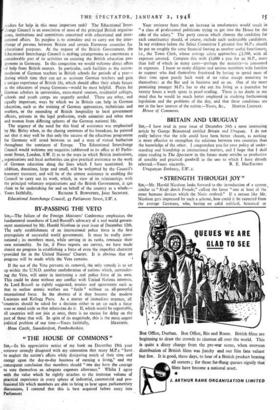" THE HOUSE OF COMMONS "
Snt,—In his appreciative notice of my book on December 19th your ti reviewer strongly disagreed with my contention that many M.P.s " have to neglect the nation's affairs while dissipating much of their time and energy upon the day-to-day business of earning a living," and my consequent conclusion that members should " one day have the courage to vote themselves an adequate expenses allowance." Whilst I agree with the value which he rightly attaches to the immense volume of Practical experience in every sphere of industrial, commercial and pro- fessional life which members are able to bring to bear upon parliamentary discussions, I contend that this is best acquired before entry into Parliament
Your reviewer fears that an increase in emoluments would result in " a class of professional politicians trying to get into the House for the sake of the salary." The party caucus which chooses the candidate for each constituency should, of course, exclude such undesirable candidates. In my evidence before the Select Committee I pleaded that M.P.s should be put on roughly the same financial footing as another useful functionary, i.e., the Town Clerk, whose average salary approaches £1,500, with all expenses covered. Compare this with £1,000 a year for an M.P., more than half of which in many cases—perhaps the majority–is consumed in expenses. I know so many diligent and serious members with families to support who find themselves frustrated by having to spend most of their time upon purely hack work of no value except monetary to themselves: at the Bar and in business and so on. One of the more promising younger M.P.s has to eke out. his living as a journalist by twenty hours a week spent in proof-reading. There is no doubt in my mind that he would be much better employed in studying forthcoming legislation and the problems of the day, and that these conditions are not in the best interest of the nation.—Yours, &c., Maxim,' LINDSAY.
House of Commons.






































 Previous page
Previous page